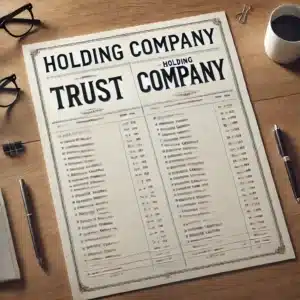Let’s explore the difference between a trust and holding company in this post.
Knowing the distinction allows investors to secure their money in compliance with relevant rules and regulations, manage their tax obligations, and arrange their assets efficiently.
If you are looking to invest as an expat or high-net-worth individual, which is what I specialize in, you can email me (advice@adamfayed.com) or WhatsApp (+44-7393-450-837).
Before we detail the difference between a trust vs holding company, let’s first understand the meaning of these terms.
Holding company vs Trust
What is a trust?
The three necessary components of a trust are beneficiaries, trust property, and a trustee.
A trust is a binding legal agreement. The settlor is the one who creates the trust, while assets held in the trust are owned and operated by the trustee on behalf of the beneficiaries. Together with acting as the trustees’ operating handbook, the trust deed maintains all of these connections.

A trust, to put it simply, expresses your wishes on the timing and disposition of your assets—which may include sentimental objects— to relatives or nonprofit orgs.
Living, testamentary, revocable and irrevocable trusts are the different types of trusts.
What is a holding company?
A holding company is an entity that possesses sufficient voting stock in another entity to oversee its policies and functions. They are used to establish corporate groups and offer benefits including control over divisions, tax breaks, and asset protection.
Pure, mixed, immediate, and intermediate are types of holding companies.
Can a holding company be a trust?
A holding company might be created inside a trust framework in several circumstances. As an example, a family trust may own stock in a holding company that in turn owns stock in other companies. This arrangement may provide additional asset protection as well as possible tax benefits.
However, owing to its complexity, this arrangement requires careful design and legal expertise in order to comply with all current rules and regulations.
Can a holding company own a trust?
Yes, a holding company can own a trust in a structure dubbed trust holding company.
The holding company in this arrangement owns the shares of a trust company that oversees the trust’s assets.
Forming and transferring shares to the holding company are the first steps in establishing a trust holding company. The trust company is set up to manage the trust assets.
The board of directors or other management structures of the holding company are used to exert control over the trust’s assets and operations. It is significant because the trust is a separate legal entity in and of itself, protecting its assets from holding company obligations. As such, assets kept in the trust are not repossessed by the holding company’s creditors.
What’s the difference between a trust and holding company?

- Structure. A holding company is an organization that controls other businesses and possesses the most voting shares; a trust is a formal arrangement in which assets are moved to a trustee for the beneficiaries’ benefit.
- Assets. A trust holds assets transmitted by a grantor; a holding company owns the stocks and assets of controlled firms.
- Management. While trusts, with grantor control in revocable trusts, manage assets administered by trustees under trust deeds, holding companies control subsidiaries by majority voting stock.
- Purpose. Entrepreneurs use holding corporations to oversee and profit from other businesses, whereas grantors create trusts for estate planning, tax planning, and asset protection.
- Tax rewards. Both holding companies and trusts have tax advantages, although trusts are typically treated better.
How to set up a trust and holding company
Setting Up a Trust
- Put your trust in more than 80 common law nations, including the US, Australia, Canada, and the UK.
- Give specific explanations for your trust’s creation, such as asset protection, tax savings, or confidentiality preservation.
- Whether it’s a directed trust, offshore trust, family trust, or corporate trust, decide which kind best suits your objectives.
- Select appropriate trustees to supervise the administration of the trust and carry out their duties.
- Create a trust declaration that includes important information about the beneficiaries, trustee responsibilities, and trust name.
- Gather the necessary paperwork, such as bank account information, tax information, and tax identification numbers.
Setting Up a Holding Company
- Explain your intentions clearly, including whether you created the holding company to protect assets from creditors or to acquire a controlling stake in other businesses.
- Choose a jurisdiction that satisfies your business needs.
- Establish the holding company’s management structure, ownership structure, and entity type.
- Get the holding company registered with the appropriate authorities and obtain the necessary paperwork, such as bank accounts and TIN numbers.
- To ensure efficient asset preservation and administration, use the holding company to purchase equity holdings in other businesses.
Pained by financial indecision?

Adam is an internationally recognised author on financial matters with over 830million answer views on Quora, a widely sold book on Amazon, and a contributor on Forbes.



